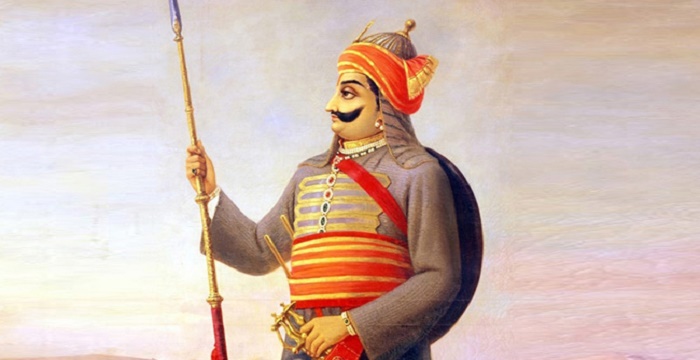Maharana Pratap was a Hindu maharaja from Mewar, a Rajput confederacy in what is now Rajasthan. In Rajasthan, he is revered as a hero for successfully repelling the Mughal emperor Akbar’s attempts to seize his domain. His father, Rana Udai Singh, is regarded as a weak king, but Maharana Pratap is regarded as a fearless and brave warrior who refused to bow to the Mughal invasion and fought valiantly until the end to defend his land and people. He was Rana Udai Singh II’s eldest son and the designated crown price who began demonstrating his heroism during his father’s reign. While numerous of Pratap’s brothers served the Mughal emperor Akbar, including Shakti Singh, Jagmal, and Sagar Singh, Pratap opted to defy Mughal pressures to submit. Akbar dispatched six diplomatic teams to Pratap in the hopes of forming an alliance with him, but Pratap flatly refused to comply with the Mughal’s demands. The Rajputs and the Mughals were doomed to fight one other. Despite the fact that the Mughal army outnumbered the Rajput army by a large margin, Maharana Pratap fought valiantly till the finish. He died a hero, and every year on the 3rd day of the Jyestha Shukla phase, his birth anniversary (Maharana Pratap Jayanti) is commemorated as a full-fledged festival.
Personal History and Legacy
Maharana Pratap, the eldest son of Udai Singh II and Maharani Jaiwanta Bai, was born on May 9, 1540, in Kumbhalgarh Fort, Rajasthan. His father was the king of Mewar, which had its capital in Chittor. Pratap was granted the title of Crown Prince because he was the ruler’s eldest son.
Chittor was encircled by Emperor Akbar’s Mughal armies in 1567. Rather than surrender to the Mughals, Maharana Udai Singh left the capital and relocated his family to Gogunda.
Prince Pratap desired to remain in the background and fight. However, the family’s elders persuaded him that leaving Chittor was the wisest option. Udai Singh and his nobles established a provisional Mewar administration in Gogunda.
Reign & Accession
In 1572, Udai Singh died, and Prince Pratap succeeded him as Maharana Pratap, the 54th ruler of Mewar in the Sisodiya Rajput line. Their father had named his brother Jagmal Singh as Crown Prince in his final days.
The senior members of the royal court, however, desired Pratap to be their king because Jagmal was weak, ineffective, and had a drinking problem. Jagmal vowed vengeance and set out for Ajmer to join Akbar’s army, receiving a jagir – the town of Jahazpur – in exchange for his assistance.
The Mughals had assumed control of Chittor after the Rajputs had fled. They were unable to annex the kingdom of Mewar, though. Akbar desired to control all of Hindustan by himself, so he dispatched multiple agents to Pratap to broker a deal.
In the year 1573, Akbar dispatched six diplomatic missions to Mewar, all of which were rejected by Maharana Pratap. Raja Man Singh, Akbar’s brother-in-law, was in charge of the last of these missions. The failure to reach an agreement on a peace treaty enraged Akbar, who turned to war to assert his claim to Mewar.
In 1576, Akbar sent Man Singh and Asaf Khan I to head an army against Maharana Pratap. Ram Shah Tanwar of Gwalior and his three sons, Rawat Krishnadasji Chundawat, Maan Singhji Jhala, and Chandrasenji Rathore of Marwar, led an army of 80,000 Mughal soldiers and 20,000 Rajput soldiers.
The Battle of Haldighati was a bloodbath that saw the whole state of Mewar, with the exception of the Aravallis, fall into Mughal hands. The Mughals, on the other hand, were unable to kill or capture Pratap, who never gave up his quest to recover the throne.
Pratap reclaimed Gogunda from the Mughals in July 1576 and established Kumbhalgarh as his temporary capital. The Maharana was forced to flee into the mountainous highlands of southern Mewar when Akbar personally led a campaign against Pratap and seized Gogunda, Udaipur, and Kumbhalgarh.
Maharana Pratap, ever the tenacious warrior, stayed strong in his determination to reclaim his kingdom, and within a few years, he had reclaimed much of his lost regions, including Kumbhalgarh and the Chittor region. He also reclaimed Gogunda, Kumbhalgarh, Ranthambore, and Udaipur in the end.
Battles of Importance
Maharana Pratap faced the Mughal armies in the Battle of Haldighati in 1576. Despite the fact that his army was vastly outmanned by the Mughals, the Rajputs fought fiercely.
Although the Rajput army suffered significant losses, including the death of the Maharana’s favorite horse Chetak, the Mughals were unable to kill or capture the Maharana himself.
Personal History and Legacy
Maharana Pratap had 11 wives, including Maharani Ajabde Punwar, who was his first and favorite. He was the father of 17 sons and five daughters.
He was injured in a hunting accident and died on January 29, 1597, at the age of 57. Amar Singh, his son, succeeded him after he died.
Pratap told his son on his deathbed not to succumb to the Mughals and to reclaim Chittor. However, in 1614, Amar Singh surrendered to Emperor Jahangir, Akbar’s son.
Estimated Net worth
Maharana is one of the wealthiest world leaders and one of the most beloved. Maharana Pratap’s net worth is estimated to be $1.5 million.
